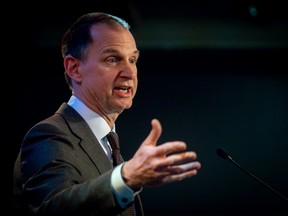Business tax credits will be the single biggest slash. Finance Minister Eric Girard also wants state-owned enterprises to find $1 billion in savings.

Article content
QUEBEC — Optimization is back on the agenda in Quebec City — big time.
Finance minister Eric Girard said Tuesday he’s aiming to find $2.9 billion of savings in the next five years as the Legault government kick-starts a review of all spending programs in a bid to return to budget balance by the end of the decade.
Article content
Cuts to business tax credits will be the single biggest contributor to the effort, generating $1.04 billion over the period, Girard said in his budget speech. State-owned companies such as Hydro-Québec and Loto-Québec will also be asked to come up with $1 billion — combined — though various “optimization efforts,” while tougher tax audit and collection measures bring in $563 million and higher tobacco levies yield another $300 million.
Advertisement 2
Article content
About 35 per cent of the expected savings will occur in the fiscal year that starts in April 2028, budget documents show.
“Government interventions must always be efficient,” Girard told lawmakers Tuesday at the National Assembly. Although tax assistance to businesses is being reduced, “it will remain competitive.”
Further efficiencies may yet materialize following a review of all tax and budgetary expenditures that Girard announced Tuesday. Results will be announced in next year’s budget. Until then, Quebec isn’t incorporating any potential savings from the initiative in its fiscal outlook.
Quebec periodically faces calls from economists to streamline its tax and budgetary expenditures to free up money for new wealth-creation measures. Spending programs worth $136 billion will be analyzed, as will existing tax measures worth $74 billion, Girard said.
Spending by the provincial government has surged 48 per cent in six years, according to the Montreal Economic Institute, a right-wing think tank. It says focusing on the number of government employees could help Quebec generate savings. Quebec has about 78,000 full-time equivalent public service employees, Treasury Board president Sonia LeBel said Tuesday.
Advertisement 3
Article content
“If the expense review is conducted with the necessary care and allows Quebec to remain competitive, why not? We’re not worried. What’s worrisome is when a government adds layer upon layer of complexity,” said Michel Leblanc, head of the Chamber of Commerce of Metropolitan Montreal.
Key business-specific measures impacted by the 2024-25 budget include raising limits on tax credits for Quebec film or television productions, computer-aided special effects and the development of e-business.
“It’s going to be important to monitor the impact of these changes on the competitiveness of the sector,” Leblanc stressed.
The changes will take effect after 2025, Girard told reporters. They are designed to refocus tax assistance to the information technology sector on the highest value-added jobs while tightening tax assistance for visual effects and animation by tying it to labour expenditures, he said.
“These tax credits were created when the unemployment rate in Quebec was 10 per cent. We are now at full employment,” Girard said. Revamping the tax credit system “was one of the recommendations made by the experts that we consulted.”
Advertisement 4
Article content
Quebec is also scrapping an employer tax credit to encourage the retention of workers age 60 and over, which Girard introduced in 2019.
“We evaluated it and after four years, it didn’t deliver what we wanted,” he said. “It’s very sparingly used. Companies don’t need this tax incentive to hire people because there’s a labour shortage.”
Other incentives, including a personal tax credit for working seniors, will remain.
Much is expected of state-owned companies such as Loto-Québec, the Société des alcools du Québec and Investissement Québec – especially after lower-than-normal water levels forced Hydro-Québec last month to slash its annual dividend to the government by $1 billion.
Quebec had originally announced plans to improve the efficiency of government-owned enterprises in 2018, but the initiative was shelved when the COVID-19 pandemic erupted, Girard said Tuesday.
The contribution of each government enterprise will be determined over the coming year, Girard said. Each will be responsible for identifying and implementing the steps needed to achieve the targets.
Savings will be expected starting in fiscal 2025-26, the minister said.
Hydro-Québec faces perhaps the toughest task. Canada’s biggest electricity producer is months into a 12-year, $185-billion plan to boost output and significantly reduce power outages. The expansion could require the utility to hire about 25,000 people a year, chief executive Michael Sabia has said.
“These investments have an economic vocation,” Girard told reporters. “When you invest, you improve your capacity to generate revenue. I spoke with Mr. Sabia on Sunday, and we’re going to work together after the budget. We’re going to sit down with each state enterprise to see how they can generate efficiencies over a five-year horizon.”
Recommended from Editorial
Advertisement 5
Article content
Article content





